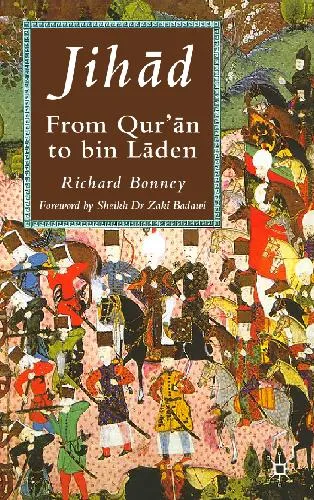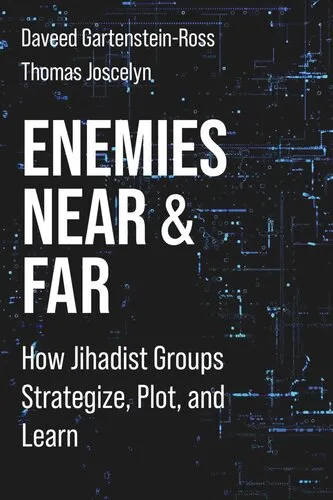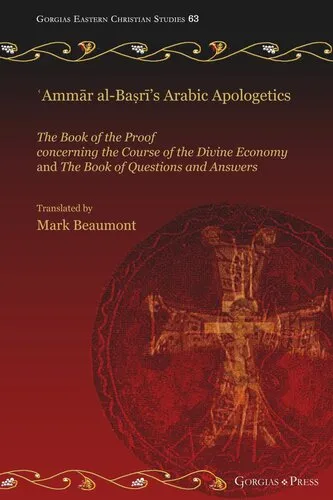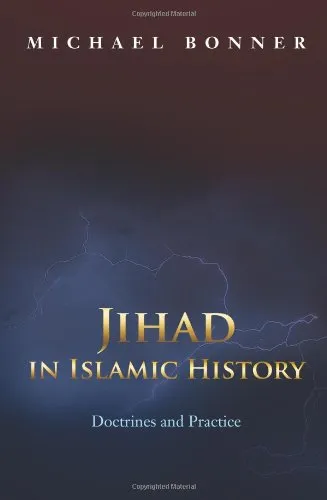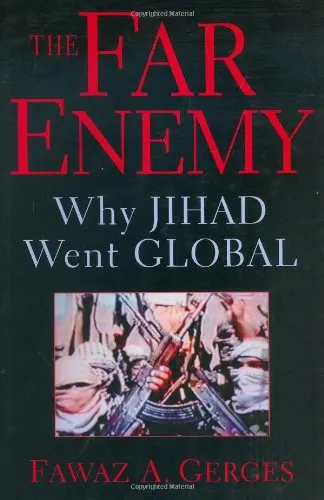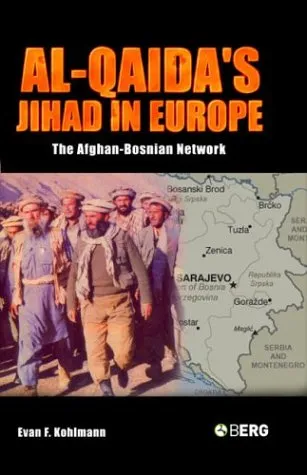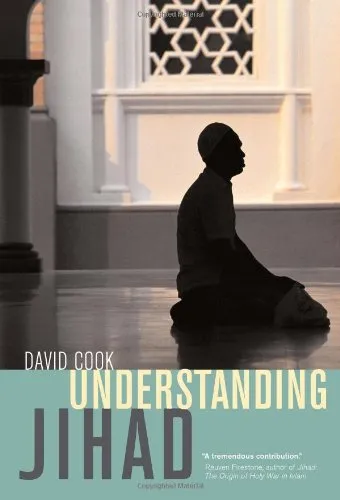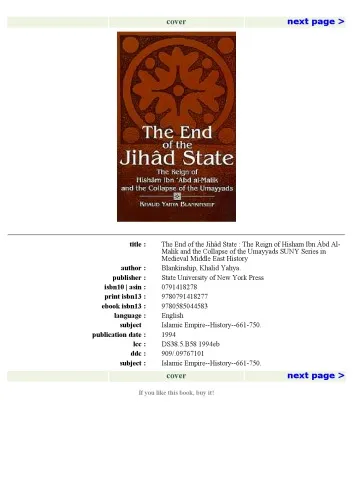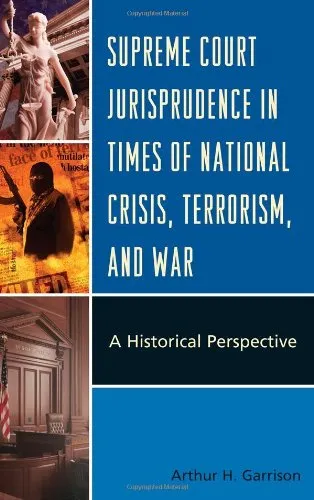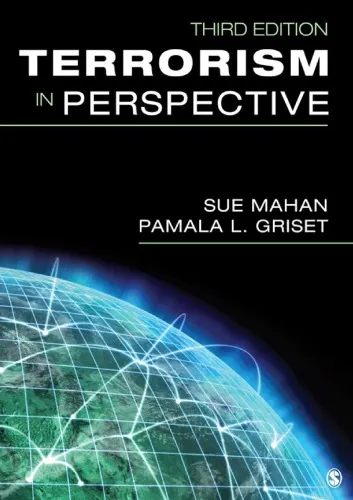Jihad From Qur’n to bin Laden
3.9
بر اساس نظر کاربران

شما میتونید سوالاتتون در باره کتاب رو از هوش مصنوعیش بعد از ورود بپرسید
هر دانلود یا پرسش از هوش مصنوعی 2 امتیاز لازم دارد، برای بدست آوردن امتیاز رایگان، به صفحه ی راهنمای امتیازات سر بزنید و یک سری کار ارزشمند انجام بدینکتاب های مرتبط:
معرفی کتاب "Jihad From Qur’n to bin Laden"
کتاب "Jihad From Qur’n to bin Laden" یکی از آثار برجسته در حوزه مطالعات سیاسی، تاریخی و دینی است که به تحلیل مفهوم جهاد در اسلام میپردازد. این کتاب با بررسی ریشههای کلمه جهاد در قرآن، تعالیم فقهی و تاریخی آن، تا تأثیر این مفهوم بر جریانهای معاصر مانند القاعده و شخصیتهایی چون اسامه بن لادن، مخاطب را با دیدگاهی تحلیلی و همهجانبه آشنا میکند. نویسنده در این اثر تلاش کرده است تا با بررسی مستندات اولیه و تحلیل تغییرات معنایی جهاد در گذر زمان، تصویری واقعی از تأثیر این مفهوم در جوامع اسلامی و جهانی ارائه دهد.
خلاصهای از کتاب
این کتاب در چند بخش جامع و ساختارمند تقسیم شده است. ابتدا نویسنده به بررسی ریشه واژه جهاد در قرآن میپردازد و مفهوم آن را به ارتباط با عبادات، تلاش معنوی و مبارزه در راه خدا مرتبط میسازد. سپس، در فصلهای بعدی، تحولات تاریخی این مفهوم از زمان ظهور اسلام تا دوران خلفا و گسترش فتوحات اسلامی بهطور عمیق تحلیل میشود. در این مسیر، نقش تحولات مذهبی و سیاسی در سدههای میانه نیز بررسی میگردد.
یکی از بخشهای قابل توجه این کتاب، تحلیل نویسنده از تأثیرات مدرن بر معنای جهاد است. این فصل بهویژه بر ظهور جریانهای افراطگرا مانند القاعده و رهبران شناختهشدهای نظیر بن لادن متمرکز است، که چگونه از این مفهوم برای توجیه اقدامات خود استفاده کردهاند. در این کتاب، علاوه بر نقد نظریههای افراطی، به مسائل پیچیدهای همچون تأثیر رسانهها و سوءتفاهمهای غرب نسبت به اسلام پرداخته میشود.
نکات کلیدی
- ریشهیابی مفهوم جهاد در قرآن، حدیث و متون فقهی اسلامی.
- تحلیل تاریخی تغییرات معنایی جهاد در دوران اسلامی.
- بررسی ظهور گروههای افراطگرا و نقش آنها در تحریف مفهوم جهاد.
- تأثیر رسانه و سیاست غربی بر درک عمومی از جهاد.
- تلاش برای تبیین برداشتهای حقیقی و افراطی از مفهوم جهاد.
جملات معروف از کتاب
"جهاد در ابتداییترین مفهوم خود، تلاش معنوی و عبادات است، اما در بسترهای تاریخی و سیاسی، بهتناسب زمان و موقعیت، مفهومی پیچیدهتر یافته است."
"درک ناقص از واژه جهاد، چه در جوامع اسلامی و چه در میان غیرمسلمانان، یکی از بزرگترین معضلات ارتباطی دوران معاصر است."
چرا این کتاب اهمیت دارد؟
کتاب "Jihad From Qur’n to bin Laden" نه تنها برای دانشجویان و پژوهشگران مطالعات اسلامی و سیاست، بلکه برای تمام افرادی که علاقهمند به درک بهتر از دین اسلام و چالشهای مدرن آن هستند، اثری حیاتی به حساب میآید. نویسنده با ارائه دیدگاهی مستقل و علمی، بهدور از پیشداوری، به بررسی یکی از پیچیدهترین و مورد سوءتفاهمترین مفاهیم در اسلام پرداخته است. جهاد، موضوعی است که تأثیر عظیمی بر روابط بین جوامع اسلامی و غرب داشته، و این کتاب با تحلیل عمیق خود پلی برای فهم متقابل فراهم میکند.
اهمیت این اثر در این است که نهتنها بهعنوان منبعی برای درک تاریخی و فلسفی جهاد شناخته میشود، بلکه میتواند راهنمایی برای سیاستمداران و تحلیلگران اجتماعی باشد که خواهان شناخت پیچیدگیهای فرهنگی و دینی در روابط بینالملل هستند.
Introduction to "Jihad From Qur’n to bin Laden"
"Jihad From Qur’n to bin Laden" is an insightful and thought-provoking exploration of one of the most misunderstood concepts in Islamic theology and its evolution across centuries. This book delves into the origins, interpretations, and modern manifestations of jihad, connecting its spiritual roots in the Qur'an to its politicized and controversial iterations today. By tracing the journey of jihad, the book provides readers with a nuanced understanding of its significance, complexities, and the individuals and movements that have interpreted and acted upon this concept throughout history.
The work not only offers a historical narrative but also challenges preconceived notions and stereotypes associated with jihad, especially in the post-9/11 world. It sheds light on the spiritual essence of the term, contrasting it with how militant groups, like al-Qaeda and others, have redefined it to fuel their agendas. Whether you are a student of religion, history, or politics, or simply someone seeking a clearer understanding of this frequently debated topic, this book offers a comprehensive guide that educates and engages.
Detailed Summary of the Book
The book begins by defining the term "jihad," a word that often evokes powerful reactions but is rarely understood in its entirety. Drawing on Qur'anic verses, prophetic traditions, and historical accounts, it presents jihad in its original context as a struggle for spiritual self-improvement, justice, and community welfare. It distinguishes between the lesser jihad (armed struggle) and the greater jihad (personal, spiritual growth), emphasizing the latter's importance in Islamic teachings.
As the narrative progresses, the book examines how the historical environment shaped the different interpretations of jihad. It explores the challenges faced by early Muslim communities, how jihad was deployed in the defense of the faith during its formative years, and the role of military campaigns in the expansion of the Islamic polity. The author meticulously examines medieval Islamic legal and theological discourses that institutionalized specific frameworks around jihad. This period saw the term codified into both spiritual and military dimensions, as well as geographic divides (Dar al-Islam vs. Dar al-Harb).
From the medieval period, the book moves to more modern interpretations, particularly during the colonial era, when jihad served as both a resistance and reformist ideology against foreign domination. The author then shifts focus to the 20th century, tracing the rise of political Islam, the role of jihad in anti-colonial movements, and its co-optation by modern extremist ideologies.
The final part of the book delves into how jihad has been weaponized in the post-9/11 world, focusing particularly on terrorist figures like Osama bin Laden. It investigates how groups like al-Qaeda have distorted the concept to justify their actions, offering an incisive critique of these modern interpretations. Throughout, the book challenges readers to think critically about the intersection of faith, politics, and violence.
Key Takeaways
- Jihad is a multifaceted concept with deep spiritual roots; its original essence is far removed from the violent connotations it has acquired in modern times.
- Throughout history, the interpretation and application of jihad have evolved significantly based on social, political, and historical contexts.
- The distinction between the greater jihad (spiritual self-struggle) and lesser jihad (physical or armed struggle) is a vital framework for understanding Islamic teachings.
- Modern extremist interpretations of jihad are distortions and do not reflect its core teachings in the Qur'an and early Islamic tradition.
- Jihad, when understood properly, represents a broader, more inclusive struggle for justice, morality, and societal reform.
Famous Quotes from the Book
"Jihad, in its truest sense, is not a call to arms but a call to the betterment of oneself and society."
"To equate jihad solely with violence is to ignore the nuanced spectrum of struggles embedded in Islamic tradition—a spectrum that prioritizes peace, personal growth, and justice."
Why This Book Matters
In today’s world, where misinformation and stereotyping about Islam and jihad are rampant, "Jihad From Qur’n to bin Laden" serves as an essential guide for anyone seeking clarity on the subject. The book dismantles myths, counters shallow narratives, and invites readers to engage with authentic Islamic teachings. It shows how terms and concepts, often misunderstood or manipulated, can have profound implications for global perceptions and policies.
By bridging the gap between Islamic theology and modern socio-political realities, the book fosters understanding and dialogue. It equips readers not only with the knowledge to separate fact from fiction but also with the tools to approach complex topics with nuance and empathy. In a polarized world, this book is a beacon for those who seek truth through historical and religious scholarship.
دانلود رایگان مستقیم
شما میتونید سوالاتتون در باره کتاب رو از هوش مصنوعیش بعد از ورود بپرسید
دسترسی به کتابها از طریق پلتفرمهای قانونی و کتابخانههای عمومی نه تنها از حقوق نویسندگان و ناشران حمایت میکند، بلکه به پایداری فرهنگ کتابخوانی نیز کمک میرساند. پیش از دانلود، لحظهای به بررسی این گزینهها فکر کنید.
این کتاب رو در پلتفرم های دیگه ببینید
WorldCat به شما کمک میکنه تا کتاب ها رو در کتابخانه های سراسر دنیا پیدا کنید
امتیازها، نظرات تخصصی و صحبت ها درباره کتاب را در Goodreads ببینید
کتابهای کمیاب یا دست دوم را در AbeBooks پیدا کنید و بخرید
